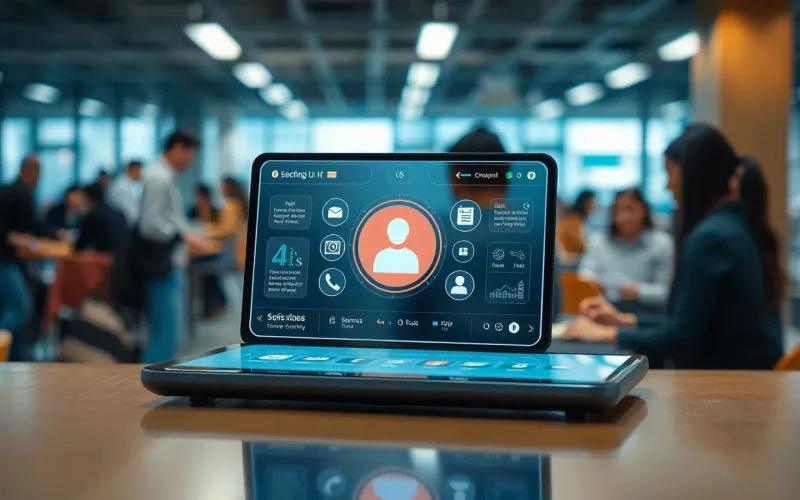Table of Contents
ToggleIn a world where technology evolves faster than a cat video goes viral, Universal AI stands at the forefront, ready to reshape our lives. Imagine a digital assistant that not only remembers your coffee order but also predicts your mood based on the weather. Sounds like something out of a sci-fi flick, right? Well, buckle up because it’s closer than you think.
Overview Of Universal AI
Universal AI represents a significant shift in technology, set to redefine how individuals interact with digital platforms. This innovation encompasses a range of functionalities that enhance user experience and personalization.
Definition Of Universal AI
Universal AI refers to advanced artificial intelligence systems capable of understanding and mimicking human-like responses. These systems not only process information but also learn from interactions, adapting to individual user preferences over time. Functionalities may include recognizing emotional cues and predicting needs with contextual awareness. For instance, noting a user’s mood from previous chats and suggesting appropriate activities exemplifies its intuitive design.
Importance In Today’s Technology Landscape
Universal AI holds crucial relevance in today’s technology landscape due to its potential to improve efficiency and effectiveness in various fields. Businesses benefit from its ability to provide personalized customer service, driving engagement and loyalty. Enhanced decision-making processes emerge as users rely on AI-driven insights. In education, Universal AI creates tailored learning experiences, addressing individual student needs. This level of adaptability transforms how technology integrates into everyday life, setting the stage for further advancements in the future.
Key Features Of Universal AI

Universal AI excels in several key areas that enhance its functionality. Adaptability and learning capabilities stand out, allowing it to evolve with user interactions.
Adaptability And Learning
Adaptability defines Universal AI’s core functionality. This technology learns from individual behaviors and preferences, refining its responses over time. Continuous interaction enables it to adjust to changing needs, whether those are emotional or contextual. Users benefit from a system that recalls past choices, facilitating a personalized experience. The more individuals engage, the more accurate and relevant the AI’s suggestions become. Therefore, Universal AI not only provides immediate assistance but grows smarter with each interaction.
Integration Across Platforms
Integration across platforms enhances Universal AI’s versatility. It connects seamlessly with different devices and applications, ensuring a unified user experience. Users can access its features from smartphones, computers, or smart home devices without disruption. The ability to operate in various environments allows for consistent, real-time support. Additionally, data synchronization across platforms ensures that users’ preferences remain intact, regardless of where they access the AI. This cohesive functionality optimizes daily activities, reinforcing the significance of Universal AI in contemporary digital life.
Applications Of Universal AI
Universal AI finds applications across diverse sectors, enhancing efficiency and personalization. Its capabilities redefine interactions in various fields.
In Business And Industry
Universal AI transforms customer service and operational processes. Companies utilize it to analyze data, predict trends, and improve decision-making. Automation features streamline tasks, allowing employees to focus on strategic initiatives. Organizations use chatbots powered by Universal AI for personalized customer interactions, responding in real-time to inquiries. Tailored marketing campaigns leverage user data, increasing engagement and conversion rates. Enhancements in supply chain management further optimize inventory and logistics by predicting demand. Overall, the integration of Universal AI results in increased productivity and customer satisfaction.
In Healthcare
Universal AI revolutionizes healthcare delivery and patient management. Healthcare providers implement AI-driven tools for diagnosing conditions based on patient data. Predictive analytics identify health risks and recommend personalized treatment plans. Universal AI assists in monitoring patient progress through wearable devices, ensuring timely interventions. Telehealth services use this technology for virtual consultations, enhancing access to care. By streamlining administrative tasks, healthcare professionals save time and resources. Furthermore, patient education benefits from customized resources tailored to individual needs.
In Education
Universal AI enhances learning experiences and educational outcomes. Personalized learning platforms adapt to each student’s strengths and weaknesses. This technology identifies gaps in knowledge and offers tailored resources for improvement. Educators benefit from AI-driven insights to create effective lesson plans that meet diverse learning styles. Feedback mechanisms ensure students receive real-time guidance, fostering confidence and engagement. Universal AI also streamlines administrative tasks for educators, allowing more time for student interaction. Overall, the integration of this technology leads to improved academic performance and student satisfaction.
Challenges And Concerns
Universal AI presents various challenges and concerns that must be addressed. As this technology evolves, attention to ethical implications and security issues becomes crucial.
Ethical Considerations
Ethical concerns arise regarding accountability and decision-making processes in Universal AI systems. Stakes include transparency, where users deserve clarity about how their data is used and how AI systems operate. Bias in algorithms presents another ethical challenge, as systems trained on flawed data can perpetuate existing stereotypes. Public trust hinges on fairness in AI applications, ensuring equitable access and treatment for all users. Regulations around implementing Universal AI must be developed to protect user rights while fostering innovation.
Security Risks
Security risks pose significant challenges for Universal AI implementation. Threats to personal data privacy arise, as sensitive information can be vulnerable to breaches. The interconnected nature of Universal AI across devices amplifies these risks, potentially exposing users to cyber attacks. Additionally, unauthorized access can lead to data manipulation and misuse, further compromising user safety. Developing robust security protocols and regular system audits mitigates these risks, protecting both the users and the technology.
Future Outlook Of Universal AI
The future of Universal AI holds transformative potential in various sectors. Innovations continue to emerge, shaping how this technology evolves.
Trends To Watch
Increased adoption of Universal AI in everyday applications is on the horizon. Companies will prioritize user-centric designs that enhance personalization, making tools more intuitive. Advances in natural language processing enhance human-computer interaction, focusing on making interactions feel more organic and less robotic. Growth in collaboration between AI and Internet of Things devices promises seamless connectivity. Watch for improved capabilities in predictive analytics, which empower businesses to anticipate customer needs and optimize operations effectively.
Potential Impact On Society
Universal AI promises to redefine societal interactions across multiple dimensions. Enhanced efficiency in service delivery revolutionizes industries like healthcare and education, leading to more accessible resources. Adoption of AI-driven technology could result in personalized learning experiences, fostering better educational outcomes for various learners. Job landscapes may shift as some roles evolve to include more collaborative interactions with AI. Ethical implications surrounding fairness and bias will require proactive engagement to maintain public trust. As Universal AI integrates into daily activities, its influence on productivity and quality of life cannot be understated.
Universal AI stands at the forefront of technological innovation with its potential to reshape user experiences across various sectors. By enhancing personalization and efficiency it promises to revolutionize interactions in business healthcare and education. As this technology evolves the focus on ethical considerations and user trust will be crucial in ensuring its responsible implementation.
The future of Universal AI is bright with trends pointing toward deeper integration and improved adaptability. As organizations embrace these advancements they’ll likely witness significant benefits in productivity and customer satisfaction. The journey of Universal AI is just beginning and its impact on daily life will only continue to grow.





